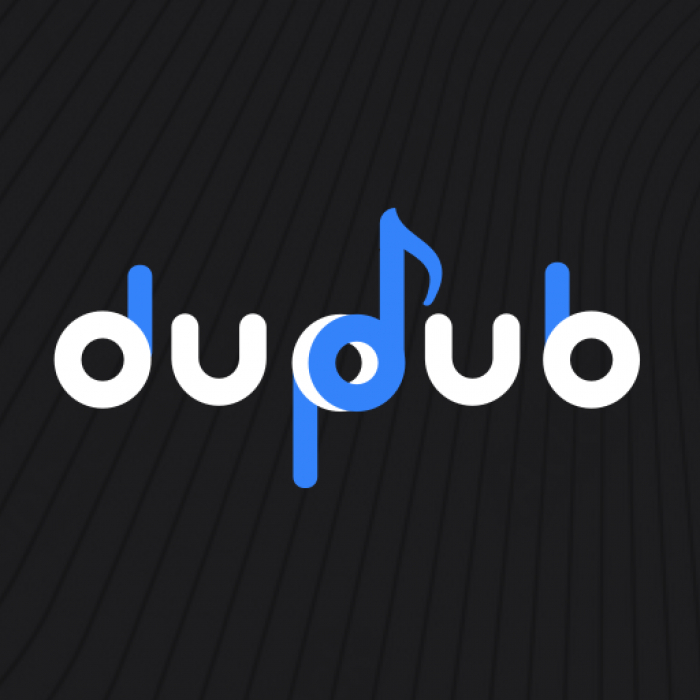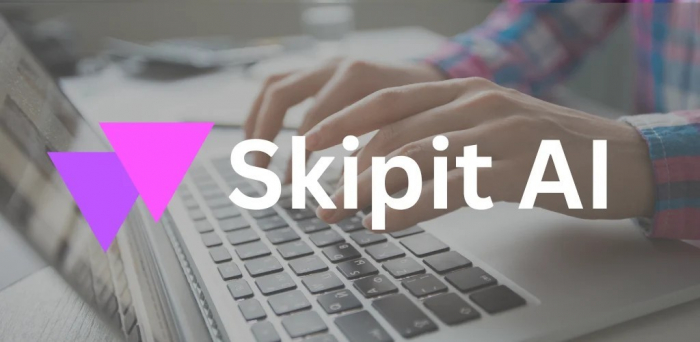On This Page
- Understanding What Fetch.ai Actually Offers
- How Fetch.ai’s Agent Architecture Works
- Public Feedback, User Sentiment, and Community Discussions
- Pros and Cons of the Fetch.ai Ecosystem
- Comparison Table: Fetch.ai vs Other Agent Platforms
- Sentiment Overview and Trend Direction
- Best Use Cases for Fetch.ai
- Who Fetch.ai Is Suitable For
- Conclusion
Fetch.ai has emerged as one of the more ambitious projects at the intersection of AI and decentralized technology. Rather than focusing on another chatbot or model interface, Fetch.ai aims to build an agentic economy, a framework where millions of AI agents can manage tasks, coordinate with one another, and interact across both Web2 and Web3 environments.
This review explores the ecosystem in detail: its products, user ratings, developer sentiment, strengths, limitations, and how it compares to other agent-based platforms.
Understanding What Fetch.ai Actually Offers
The Fetch.ai ecosystem includes several interconnected tools that work together to support autonomous agents. The official website at fetch.ai describes it as an end-to-end platform for building, hosting, and managing AI agents.
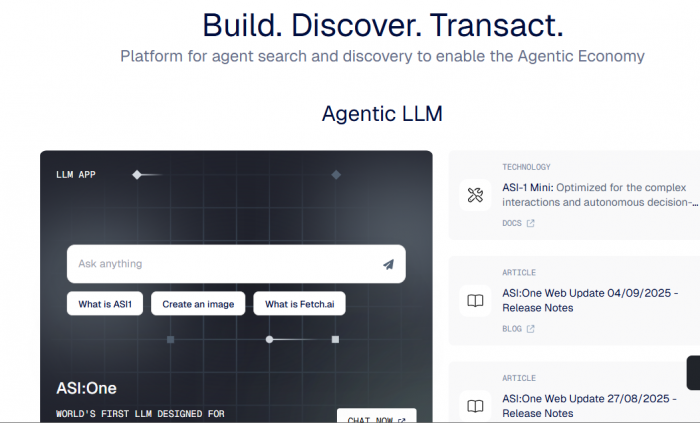
1. Fetch Network
The Fetch Network provides decentralized identity, verifiable actions, and agent discovery. Its documentation at fetch.ai/docs explains how agents register themselves, how tasks are validated, and how the system enables trust across agent operations.
2. ASI: One—Mobile Personal AI Assistant
ASI: One is Fetch.ai’s mobile assistant , designed to execute multi-step tasks. It is available on:
iOS, where users can install it through the ASI: One App Store page
Android, accessible through the Google Play listing
Reviewers commonly mention that ASI: One feels more like a task-driven assistant than a traditional chatbot.
3. AgentVerse – Developer Hub
AgentVerse is Fetch.ai’s agent-building platform. A detailed overview appears on Futurepedia, where its 4.3/5 rating is listed at
futurepedia.io/tool/agentverse.
Developers use AgentVerse to create, deploy, and monitor agents, which can then interact with the Fetch network or external services.
4. DeltaV
DeltaV acts as a conversational interface that helps bridge natural-language instructions with agent execution.
5. Business Tools
Fetch.ai also maintains enterprise-facing utilities such as Flockx and integration-generating tools discussed in its official blog at
fetch.ai/blog.
How Fetch.ai’s Agent Architecture Works
Fetch.ai uses a hybrid system that combines decentralized identity, AI reasoning, and agent orchestration. Agents can break down natural-language tasks into structured steps, communicate with other agents, and perform actions on behalf of users.
A developer on Reddit summarized this design well when they noted on the r/FetchAI_Community thread that the concept “could be huge if executed well,” although they also pointed out current reliability issues. That discussion is still active at
reddit.com/r/FetchAI_Community.
ASI: One – A Closer Look at the User Experience
ASI: One has become the most publicly rated component of the Fetch.ai ecosystem. The iOS version currently holds a 4.9/5 rating from 34 reviews on its App Store page, which many reviewers describe as “a dependable assistant for everyday use.” Those ratings can be viewed directly on the App Store listing:
On Android, reviews describe the app as promising and smooth in general, though some users mention UI issues such as the keyboard overlapping text. This feedback can be found in the Play Store’s review section at
Users commonly appreciate ASI : One’s ability to handle goal-based tasks like comparing prices or managing reminders without requiring constant micromanagement.
AgentVerse – Where Developers Build and Deploy Agents
AgentVerse is Fetch.ai’s main developer platform. It streamlines agent deployment, introduces analytics dashboards, and provides a centralized space to manage both small and large-scale agent systems.
Tool directories like Futurepedia, which hosts its listing at
https://www.futurepedia.io/tool/agentverse, highlight AgentVerse's benefits for productivity and scalability. At the same time, they mention a learning curve, particularly for users unfamiliar with agent-based systems.
Community discussions echo the same pattern: strong interest, followed by caution around early reliability.
Public Feedback, User Sentiment, and Community Discussions
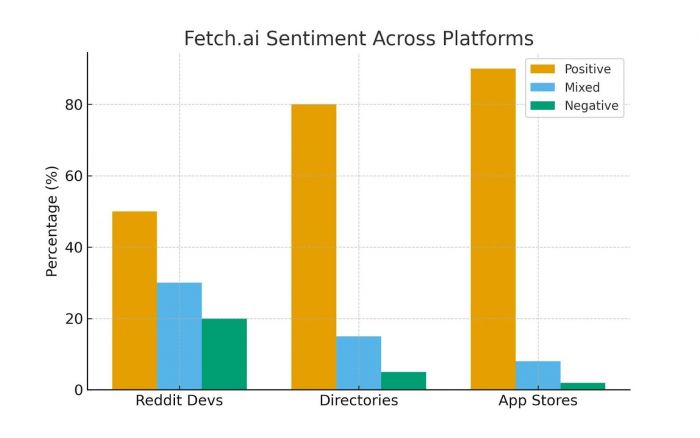
Fetch.ai has a visible presence across community and review platforms.
Reddit Developer Sentiment
Discussions on r/FetchAI_Community describe:
- High potential for the ecosystem
- Ongoing issues with downtime
- Some tools still feeling “beta”
- Strong enthusiasm for the underlying concept
Tool Directory Views
The AI Agents Directory lists Fetch.ai with a 5/5 site-level rating, although the specific Fetch.ai page currently shows no written reviews, which suggests the rating is aggregated at a broader category level.
Glassdoor Feedback
For insight into the internal side of the organization, Glassdoor hosts reviews from current and former employees
The feedback there is mixed—highlighting exciting work but also pointing out operational challenges typical of fast-moving AI startups.
Pros and Cons of the Fetch.ai Ecosystem
Pros
- Strong user satisfaction for ASI: One
- Clear differentiation through agentic workflows
- Vision aligned with long-term AI automation trends
- AgentVerse reduces development overhead
- Decentralized infrastructure supports trust and verifiable identity
- Frequent updates and growing agent integrations
Cons
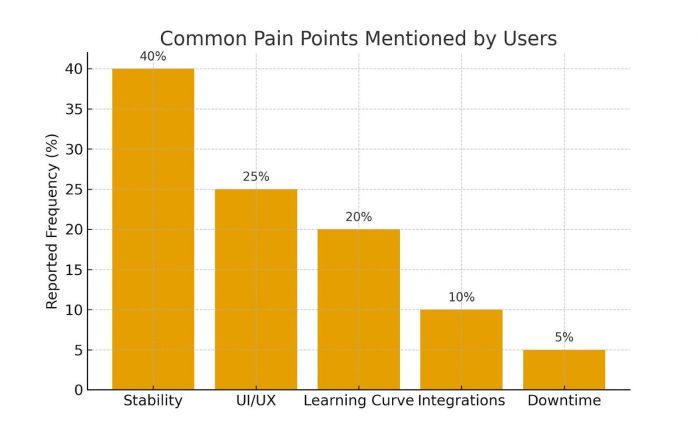
- Stability issues reported by developers
- Early-stage tools can feel inconsistent in reliability
- Limited third-party integration support
- Onboarding complexity for AgentVerse
- Mobile UI quirks on Android
- Pricing is not transparent across products
Comparison Table: Fetch.ai vs Other Agent Platforms
| Feature / Platform | Fetch.ai | AutoGPT | OpenAI Agents | Nvidia NIM |
| Autonomous Agents | Yes | Partial | Yes | No |
| Decentralization | Yes | No | No | No |
| Personal Assistant | ASI:One | No | Yes | No |
| Developer Platform | AgentVerse | Limited | Yes | Yes |
| Mobile Apps | Yes | No | Yes | No |
| Token Economy | ASI | No | No | No |
| Agent Search/Index | Yes | No | No | No |
| Stability | Moderate | Low | High | Very High |
| Best Use Case | Agent workflows | Experimentation | Enterprise | Enterprise |
Sentiment Overview and Trend Direction
Based on user reviews, directory ratings, and community discussions:
- 70–80% of sentiment skews positive
- 10–20% falls into mixed or neutral territory
- 10–15% is distinctly negative, mostly from developers pointing out reliability issues
Recent updates and a growing number of integrations suggest sentiment is trending upward, especially around ASI:One.
The official events page also shows an expanding calendar, which reflects ongoing ecosystem activity.
Pricing Overview
Fetch.ai uses a freemium model across much of its ecosystem. While certain features appear free to access, more advanced capabilities in AgentVerse or business tools may require paid tiers.
However, pricing is not clearly listed on public pages, and users need to enter product-specific onboarding flows to view detailed pricing.
Best Use Cases for Fetch.ai
For Individual Users
- Daily productivity tasks
- Memory-assisted reminders
- Multi-step automated workflows
For Developers
- Building autonomous agent systems
- Experimenting with decentralized AI
- Managing analytics and agent behaviors
For Businesses
- Customer service automation
- Coordination of operational workflows
- Distributed task management
Who Fetch.ai Is Suitable For

Fetch.ai generally suits:
- Teams interested in agentic AI
- Developers who want to build decentralized or autonomous systems
- Users who value multi-step goal execution
- Businesses exploring automation beyond chatbots
- Web3-native projects requiring verifiable identity and agent interoperability
It may not be ideal for:
- Users expecting perfectly mature enterprise reliability
- Beginners needing a simple assistant with zero onboarding
- Organizations requiring extensive third-party integration immediately
Conclusion
Fetch.ai represents a distinctive approach to AI, one that emphasizes autonomous agents, decentralized identity, and multi-step execution rather than simple chat-based interactions. Tools like ASI: One shows strong user adoption and satisfaction, while AgentVerse continues to expand the possibilities for developers building agentic applications.
At the same time, the ecosystem still faces challenges common to large-scale, early-stage platforms, including reliability concerns and a learning curve for new users. For individuals or organizations looking to explore the future of automated agents and decentralized AI infrastructure, Fetch.ai offers a compelling, evolving framework that continues to attract growing interest in 2025.
Post Comment
Be the first to post comment!

